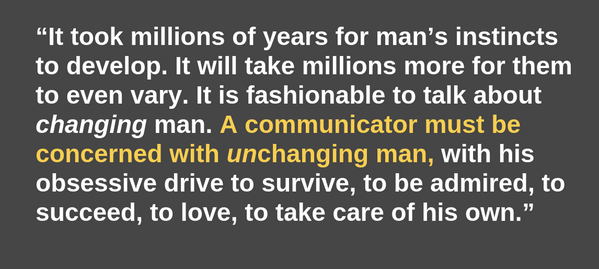
The Wisdom of Bill Bernbach
Despite
access to more customer information than ever before product messages are
clicking less often with customers. The inescapable truth is we know less about
customers than we should, given the $6 billion a year companies spend trying to
figure out what makes them tick.
Bill Bernbach, one of
advertising’s greatest minds, would understand the problem:
“Human nature hasn’t changed for a million years. It won’t even
change in the next million years. Only the superficial things have changed. It
is fashionable to talk about the changing man. A communicator must be
concerned with the unchanging man – what compulsions drive him, what
instincts dominate his every action, even though his language too often
camouflages what really motivates him.”
Bernbach
was not a psychologist, but had an uncanny intuitive grasp of human behavior.
While most of us may lack the intuitive competence of Bernbach, we can get to
know our customers better by acquiring a deeper understanding of unchanging
man. But we cannot get that understanding through traditional customer
research.
Renown brain
scientist Richard Restak has observed that "We
have reason to doubt that full awareness of our motives, drives, and other
mental activities may be possible."
Cognitive scientists tell us that with the aid of new brain canning technology, they’ve learned that about 95 percent of the mental activity going into our decision-making takes place behind the curtains of consciousness. Yet, most consumer research concentrates exclusively on the contents of consumers’ conscious minds.
Cognitive scientists tell us that with the aid of new brain canning technology, they’ve learned that about 95 percent of the mental activity going into our decision-making takes place behind the curtains of consciousness. Yet, most consumer research concentrates exclusively on the contents of consumers’ conscious minds.
The roots of motivations lie beyond the knowing reach of our conscious minds. When people tell researchers’ why they do what they do, they can only speak to what appears on the screens of their conscious minds. Those images are often at odds with their more primal sources of motivations.
Marketing mostly ignores the silent 95 percent zone in the brain. Why? The “superficial things” that show up in the conscious mind are more visible, measurable and quantifiable. Companies feel more comfortable with the measurable, so they spend vast sums researching customers’ superficial attributes. Procter and Gamble alone conducts 4,000 to 5,000 customer studies a year.
It’s harder to quantify “what compulsions
drive customers, what instincts dominate their every action.” To fathom the unchanging
man requires understanding behavior at its roots in human biology.
Ever wonder how cravings develop? Be they for sex or chocolate, they are not consciously created. It’s 3:30 PM. Your energy is sagging. A small organ over your kidneys senses a sugar shortage and sets off a flow of neuropeptide Y to alert your brain of a need for carbs. The plea reaches your conscious mind as a craving for chocolate. You ponder whether to stick to your diet or give in, then say to yourself, “What the hell,” pop a piece of Godiva in your mouth and resolve to eat salad for dinner. You enjoy the moment by giving into the craving.
While
you exercised free will (hopefully!) in reacting to the craving, the action you
took had its roots in your biology. So it is with behavior in general.
That’s lesson #1 in understanding unchanging man.
That’s lesson #1 in understanding unchanging man.
No comments:
Post a Comment